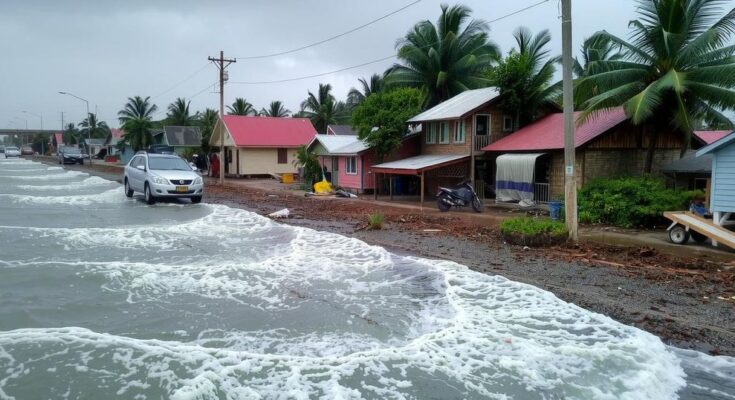Cyclone Chido has severely impacted northern Mozambique, causing widespread destruction, displacing thousands, and damaging critical infrastructure. Over 190,000 individuals urgently require humanitarian assistance. UNHCR is actively responding to the crisis, providing emergency relief and coordinating efforts with the Mozambican government and other partners. However, resources are rapidly dwindling as the region braces for further challenges in the rainy season.
Cyclone Chido recently struck northern Mozambique, unleashing torrential rains and strong winds that wreaked havoc in the Cabo Delgado and Nampula provinces. Communities have faced widespread destruction, with thousands displaced and vital infrastructure such as homes, roads, and communication systems severely damaged, complicating relief efforts in already vulnerable areas hosting a significant number of displaced individuals. The UN Refugee Agency (UNHCR) is actively collaborating with the Mozambican government and humanitarian partners to deliver urgent aid to those affected.
In the immediate aftermath, UNHCR provided critical assistance at the largest accommodation center in Pemba, benefitting over 2,600 individuals with essential supplies including blankets, sleeping mats, and mosquito nets. Preliminary estimates indicate that approximately 190,000 people are in urgent need of humanitarian aid, with nearly 10,000 homes destroyed and 33 schools affected, particularly in rural areas.
Despite the challenges, prior preparedness efforts by UNHCR and its partners, including pre-positioning relief items and disseminating disaster preparedness messages, diminished the potential impact for some communities. For instance, the Maratane refugee camp in Nampula reported minimal damage thanks to the climate-resilient housing built in recent years. However, the cyclone had devastating effects in Mayotte and southern Malawi, causing fatalities and further displacement risks.
UNHCR remains committed to helping affected communities recover but acknowledges the urgent need for additional resources as the situation continues to evolve. The organization is monitoring the potential onset of an intense rainy season that could exacerbate the existing crises and further threaten already vulnerable populations. UNHCR is actively seeking support to assist those affected during this challenging time.
Cyclone Chido is a recent weather event that has severely impacted northern Mozambique, an area already grappling with displacements due to prolonged conflict and economic instability. The effects of climate events, such as cyclones, disproportionately affect vulnerable communities including forcibly displaced populations. As Mozambique continues to face challenges from climate change, preparedness and response strategies are crucial for mitigating impact during disasters. UNHCR’s role includes coordinating disaster response efforts and providing timely assistance to those in need, as seen in the immediate actions taken post-cyclone.
The recent devastation caused by Cyclone Chido highlights the ongoing vulnerabilities faced by communities in Mozambique, particularly in the context of climate change and conflict-induced displacement. UNHCR’s proactive measures have provided necessary support to thousands, yet the need for resources remains critical as the country braces for future climatic challenges. The situation emphasizes the urgency for continued humanitarian assistance and preparedness planning to safeguard the well-being of the most affected populations.
Original Source: www.unhcr.org




